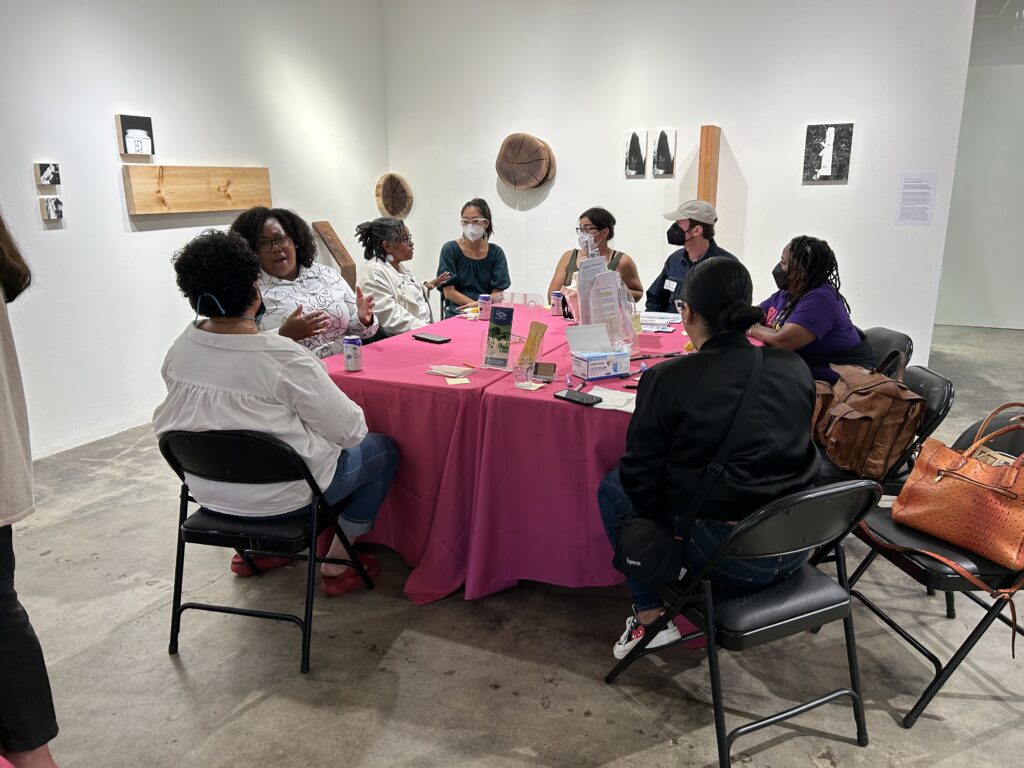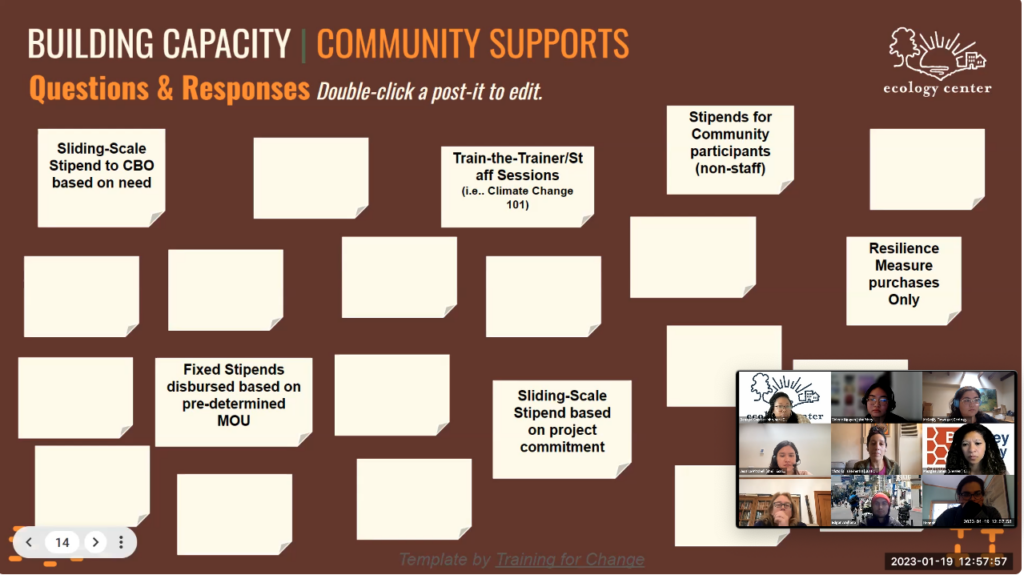 In 2022, the Ecology Center along with a number of community partners launched the Climate Equity Collaborative (the Collaborative). Our goals in convening the Collaborative are to amplify Black, Indigenous, People of Color (BIPOC) voices, elevate their experiences, and build their capacity to collaborate as partners in developing and implementing climate change and resilience solutions.
In 2022, the Ecology Center along with a number of community partners launched the Climate Equity Collaborative (the Collaborative). Our goals in convening the Collaborative are to amplify Black, Indigenous, People of Color (BIPOC) voices, elevate their experiences, and build their capacity to collaborate as partners in developing and implementing climate change and resilience solutions.
By convening the Climate Equity Collaborative, the Ecology Center seeks to address climate inequity through achieving the following outcomes:
- To build the capacity and elevate the voices of organizations and community members serving and representing low-income and disadvantaged communities in civic processes related to climate resilience and electrification efforts
- To increase the access to information, education, equipment, and resources for organizations and community members serving and representing low-income and historically disadvantaged communities as related to climate resilience and electrification efforts
- To broaden the community network around building climate resilience and electrification efforts to include organizations and community members serving and representing low-income and disadvantaged communities
Are you part of a community group, community-based, or faith-based organization that works with or represents marginalized community members in Berkeley? Join us!
DEFINING CLIMATE EQUITY
Inequity can be defined as the phenomenon of individuals of different identities having differing access to a myriad of necessities like safe and stable housing, living-wage jobs, and affordable, healthy foods due to racism and other systemic forms of oppression. Achieving equity requires acknowledgement of this reality and systemic shifts to address imbalances. Equity is an ongoing process that requires identifying and challenging the structures that have created inequities.
Under the umbrella of equity, we think of climate equity as the just distribution of the benefits that come with climate readiness, voice in building climate resilience, and ultimately an eradication of unequal burdens created by climate change. Climate equity works to balance access to key resources, while protecting vulnerable communities and populations from environmental hazards, regardless of race, income, or other characteristics. Climate equity can be made possible by recognizing and addressing the unequal burdens made worse by climate change, while ensuring that all people, especially those most impacted by climate change, share the economic and social benefits of climate protection efforts. The EPA writes, “achieving equity means that all people—regardless of their race, color, gender, age, sexuality, national origin, ability, or income—live in safe, healthy, fair communities”.
Climate justice is a movement recognizing the disproportionate impacts climate change has on frontline communities. Not only is climate justice a movement, but it is a vision where systemic changes have been made to ensure a just future for all. Climate equity is integral to achieving climate justice.
WHY DOES CLIMATE EQUITY MATTER?
Climate change is inherently unjust and inequitable; those most responsible for increased greenhouse gas emissions across the globe are most likely to be among the last to suffer from their impacts. Reaching a safe and stable climate is not possible without addressing current and historic inequities. Climate equity ensures a just transition to a future in which all communities can thrive by following the lead of those most impacted by climate change – primarily BIPOC – and prioritizing their access to infrastructure for resilience and its associated benefits. It is used to address the socioeconomic, sociocultural, and physical impacts of climate change.
BACKGROUND & LOCAL HISTORY
The Ecology Center was founded in 1969 as one of the first action-oriented environmental organizations in the country. In the early days, the Ecology Center was a meeting place where environmental thinkers and activists gathered and distributed information through the bookstore, newsletter, library, and printing press.
As an organization, we recognize that there are multiple systems of oppression and extraction that have created the climate crisis, and that have put BIPOC communities at the frontlines of experiencing the impacts of climate change first and worst. With this theory of change, our organization’s program areas are aimed at building a healthier and more just future for the East Bay port community ecosystem. For example, our Food & Farming work addresses the lack of healthy food access, as well as the unsustainable nature of large scale international agriculture. Other recent examples of this strategy include getting rid of disposable carry-out bags across the state of California (in 2016) and creating a phase shift in the battles against Big Soda by passing the nation’s first soda tax (in 2014). In each of these efforts, we punched above our weight by building a strong, local coalition to start the efforts in our communities and then partnered with organizations that could help spread our success.
CURRENT EFFORTS
The Climate Equity Collaborative is an effort to address the reality that marginalized communities, including BIPOC, people with disabilities, and low-income people often experience the harshest impacts of climate change while contributing least to greenhouse gas emissions. The intention of the Climate Equity Collaborative is to create space for community-based organizations to share best outreach practices, build capacity, and receive support in procuring resilience measures for the Berkeley communities that are most impacted by climate change.
The Ecology Center convenes the Collaborative and disburses small scale resilience measures to Collaborative members for their constituents, such as air filters, transit passes, or portable induction cooktops. This is an effort not only to invest in the resilience of frontline communities, but also to ensure that these communities are able to lead in creating climate solutions. Knowing many community-based organizations have limited capacity to take on new work, the Ecology Center is working to address barriers to participation within the Collaborative by providing additional funds for member participation, as well as services like translation and childcare.
This work builds on the Ecology Center’s lengthy history of working for a sustainable and just future for all. The Ecology Center has a long list of accomplishments relating to climate action in the East Bay, including but not limited to: the groundbreaking Residential Energy Conservation Ordinance (RECO); EcoHouse, the sustainable demonstration home and garden; the co-creation of the Berkeley Climate Action Coalition, a community-wide coalition focused on the implementation of Berkeley’s Climate Action Plan; efforts to establish East Bay Community Energy; and equitable community engagement in the development of the City of Berkeley’s Existing Buildings Electrification Strategy, including the incorporation of equity guardrails, a set of minimum requirements meant to distill discussions about equity into a mechanism that can be used to inform policy and create concrete change.
Having spent months building our relationships and convening the Climate Equity Collaborative in whole group gatherings, there are a range of nonprofits, faith-based organizations, and community groups involved with the Collaborative at this stage with the Ecology Center continuing to engage additional partners. Of our current community partners, their scopes of services and programming span the range of affordable, bilingual childcare and youth empowerment programs to parent engagement groups.
Our work to convene the Climate Equity Collaborative receives funding through the Ocean Conservancy Ports Community Grant Program, UC Berkeley’s Chancellor’s Community Partnership Fund, and the City of Berkeley’s Climate Equity Fund. The Berkeley Climate Equity Fund itself was created as a means to address structural barriers to climate resilience by investing in communities most affected by the impacts of climate change. Often identities such as being BIPOC or low-income compound one’s risk for facing hasher impacts of climate change. As the first city to enforce single family zoning, the City of Berkeley has played a significant role in disenfranchising communities of color, in terms of access to housing and economic opportunities – both of which contribute to climate injustice. By prioritizing marginalized communities, this fund is a step in the right direction.
Are you part of a community group, community-based, or faith-based organization that works with or represents marginalized community members in Berkeley? Join us!




